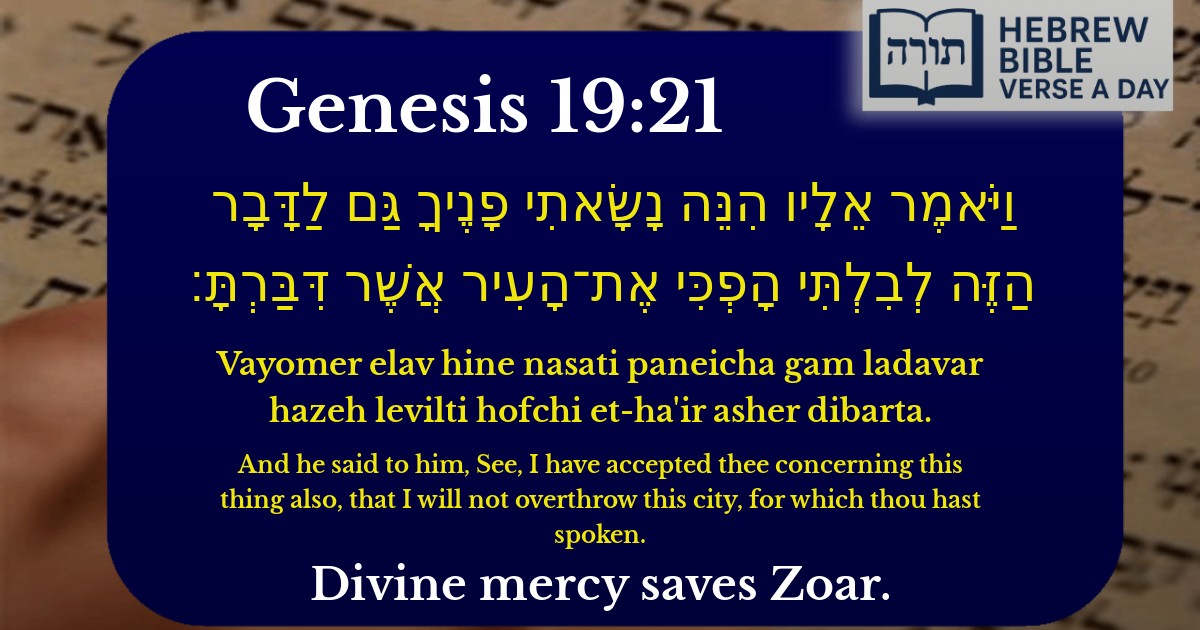Join Our Newsletter To Be Informed When New Videos Are Posted
Join the thousands of fellow Studends who rely on our videos to learn how to read the bible in Hebrew for free!
Hebrew Text
וַיֹּאמֶר אֵלָיו הִנֵּה נָשָׂאתִי פָנֶיךָ גַּם לַדָּבָר הַזֶּה לְבִלְתִּי הָפְכִּי אֶת־הָעִיר אֲשֶׁר דִּבַּרְתָּ׃
English Translation
And he said to him, See, I have accepted thee concerning this thing also, that I will not overthrow this city, for which thou hast spoken.
Transliteration
Vayomer elav hine nasati paneicha gam ladavar hazeh levilti hofchi et-ha'ir asher dibarta.
Hebrew Leining Text
וַיֹּ֣אמֶר אֵלָ֔יו הִנֵּה֙ נָשָׂ֣אתִי פָנֶ֔יךָ גַּ֖ם לַדָּבָ֣ר הַזֶּ֑ה לְבִלְתִּ֛י הׇפְכִּ֥י אֶת־הָעִ֖יר אֲשֶׁ֥ר דִּבַּֽרְתָּ׃
וַיֹּ֣אמֶר אֵלָ֔יו הִנֵּה֙ נָשָׂ֣אתִי פָנֶ֔יךָ גַּ֖ם לַדָּבָ֣ר הַזֶּ֑ה לְבִלְתִּ֛י הׇפְכִּ֥י אֶת־הָעִ֖יר אֲשֶׁ֥ר דִּבַּֽרְתָּ׃
🎵 Listen to leining
Parasha Commentary
📚 Talmud Citations
This verse is quoted in the Talmud.
📖 Berakhot 62b
The verse is referenced in a discussion about divine mercy and the power of prayer, illustrating how Abraham's intercession for Sodom was accepted by God.
📖 Sanhedrin 108b
The verse is cited in the context of discussing the destruction of Sodom and Gomorrah, emphasizing God's mercy in response to Abraham's plea.


Context in the Torah
The verse (Bereishit 19:21) appears during the dialogue between Avraham Avinu and Hashem regarding the fate of Sodom. Avraham had pleaded for the city's salvation if even a small number of righteous individuals could be found there. This verse is Hashem's response, affirming that He will not destroy the city of Tzo'ar (referred to as "this city") due to Avraham's merit and intercession.
Rashi's Explanation
Rashi (Bereishit 19:21) explains the phrase "נָשָׂאתִי פָנֶיךָ" ("I have accepted thee") as an expression of favor or granting a request. He notes that Hashem is agreeing to Avraham's earlier plea (Bereishit 18:23-32) to spare the city if righteous people are found. Rashi emphasizes that this demonstrates the power of a tzaddik's prayer and the merit of Avraham before Hashem.
Rambam's Perspective on Divine Mercy
In Moreh Nevuchim (1:54), Rambam discusses how Hashem's responses to human prayers reflect divine wisdom and mercy. This verse exemplifies how Hashem tempers strict justice with compassion when a righteous individual like Avraham advocates for others, even when they may not fully deserve it.
Midrashic Insights
Halachic Implications
The Gemara (Rosh Hashanah 17b) derives from this verse that Hashem's attribute of mercy is activated when the righteous pray for others. This principle is foundational in Jewish thought regarding the power of tefillah (prayer) and the importance of advocating for others.
Chassidic Interpretation
The Sefat Emet (Vayera) explains that Avraham's plea was not merely to save the city, but to reveal the hidden sparks of kedushah (holiness) within it. Hashem's response shows that even in places like Sodom, there are elements worth preserving when viewed through the lens of a tzaddik's vision.